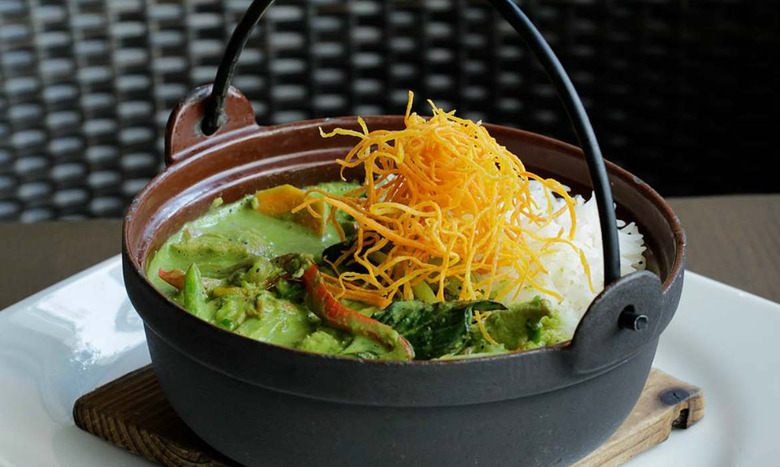Malai Kitchen: Ambitious Thai-Vietnamese In Dallas
When it comes to food genres, Dallas' scene is shaped like a doughnut. The 'hole' is most of the the 'white tablecloth,' chef-driven, and hispanic restaurants. The rim is where you find most of the authentic Asian food (with each municipality seemingly having a comparative advantage in a different country). One notable exception to this geography is an experimental Thai-Vietnamese mashup named Malai Kitchen. Far from being out in the suburbs, it is in one of Dallas' successful in-town residential areas (and a major restaurant destination): Uptown.
Owners Braden and Yasmin Wages met and married at the respected Cornell University School of Hotel Administration before ending up in Dallas. Their interest, and Wages' heritage, led them to pursue Asian flavors. Malai's menu therefore consists of the flavors of a melting pot of Thai, Western, and the melting pot cuisine of Franco-culinary Vietnam. So no surprise to see Eurocentric, New American-influenced avocado shrimp salad, $13, come with coconut herb dressing and share the menu with a down-the-line rendition of drunken noodles, $13, and vermicelli salad with lemongrass chicken (bun ga nuong), $10. Don't mistake this diversity for lack of authenticity as the owners travel to southeast Asia each year to refresh their knowledge. Their subsequent fusion of Asian cuisines with each other and western influences is conscious and meditated.
At a recent media tasting we started with prawn (shrimp) crackers with curried crab dip, which serves as the 'chips and salsa' of Malai's cuisine. Only, it is much more addictive. I could have munched and slurped on these all night. We were interrupted by a selection of small plates from the 'to share' section of the menu. I would recommend going this way. A couple can consume about four (providing I am not one of the couple) and then finish a shared main course (or order one main each and take home the next day's lunch). The Vietnamese meatballs (xiu mai), $6, are juicy, spicy pork selectively seared to a meltingly smooth texture. You may want to omit the dipping sauce (although that would be inauthentic). The spring rolls with seared tuna (gỏi cuốn), $11, was rolled, seared rare ahi tuna with rice noodles, pickled bean sprouts and herbs all wrapped in rice paper. They were as light and refreshing as the meatballs had been solid and filling. Grilled satay, $6, in either its sweet soy pork or peanut-marinated chicken guises is a familiar southeast Asian specialty and as reliable here as anywhere in town. Fried imperial rolls (cha gio), $6, are deep-fried rice paper rolls filled with shrimp, pork bean thread noodles and herbs. They collapse with a satisfying crunch in the mouth and fill the palate with a complex mélange of flavors.
Our hunger pains had been sated, but we were not full, let alone stuffed, so it was on to the main courses. They are divided, menu-wise, into specialties and classics. From the specialties side we had iron pot green curry chicken, $14, a thick iron pot filled with that wonderful green curry that Thailand does so well and topped with apple eggplant (a Thai favorite), grated carrots and jasmine rice. This harnessed the warm hominess of curry with the bite of eggplant and soft chewy texture of rice. It was confidence inspiring. For me, the dish of the night, and worthy of a place on my list of Best New Dishes of 2015. From the classics, we chose drunken noodles, $13, because, well, if a noodle can't get drunk once in a while, what can it do? Malai makes their rendition from jasmine rice flat noodles, spicy chopped tenderloin, bell peppers and Thai basil. Much as the history of the dish recounts, this is good home cooking, Thai style.
It must be stated that Malai is a legitimate made-from-scratch kitchen. That includes even the coconut milk and sriracha (available for purchase). It also includes the beer, in a sense, in that Braden brews three beers: a Bia Hoi Vietnamese lager, $3, a (get ready for it) Thai-P-A, $6, and Thai 1 On, $6, a rotating seasonal beer. I tried them all and they are legit.
The wine list is a model of the 'small but well chosen' school of oenology with just under 50 selections that offer a truly thoughtful application of wine to the flavors and seasonings of southeast Asian cuisine. I know of no other southeast Asian restaurant in the Dallas area that does this. Choices, and here I select wines we found to be winners with the food, rather than just being big names, include Weinbach Gewürztraminer, $52. Craggy Range, 'Te Muna Road,' Sauvignon Blanc, $45. Aveleda 'Vinho Verde', $26, and McPherson Cellars Viognier among whites. Reds include Bodegas Filon from Aragon, Spain, $34, Château Compassant from Bordeaux, $38, a grippy cabernet blend which we enjoyed with the Imperial rolls and Vietnamese meatballs. A Renwood, 'Old Vines' Zinfandel was an unexpectedly good match with the drunken noodles.
Cocktails are acclimated to the southeast Asian theme too. You can get a Singapore Sling here!
The bar scene is lively, and a place where solo diners can eat comfortably as well. The overall restaurant vibe is relaxed and sophisticated, as diverse as the food. Designer Michael Sutton doubtless played a role here.
Malai is a small, buzzy, and aspirational southeast Asian gem that welcomes everyone to try a range of food and drink, much of which is unique to the Dallas dining scene.
